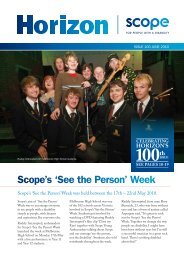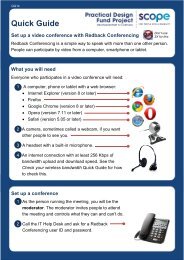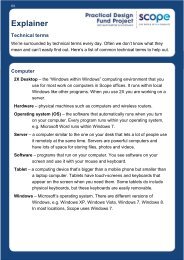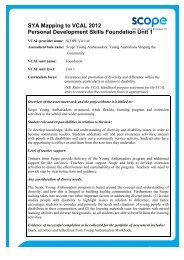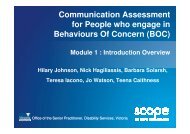Positive behaviour support Getting it right from the start
Positive behaviour support Getting it right from the start
Positive behaviour support Getting it right from the start
Create successful ePaper yourself
Turn your PDF publications into a flip-book with our unique Google optimized e-Paper software.
<strong>Pos<strong>it</strong>ive</strong> <strong>behaviour</strong> <strong>support</strong>: <strong>Getting</strong> <strong>it</strong> <strong>right</strong> <strong>from</strong> <strong>the</strong> <strong>start</strong> - Facil<strong>it</strong>ators reference manual 25<br />
PowerPoint 37<br />
PowerPoint 38<br />
*<br />
*<br />
<strong>Pos<strong>it</strong>ive</strong> <strong>behaviour</strong> <strong>support</strong>: Personal background factors<br />
<strong>Getting</strong> to know <strong>the</strong> person<br />
Behaviours of concern rarely occur for no reason nor can <strong>behaviour</strong> be explained by a single<br />
factor or attributed to a single reason or cause.<br />
In this section we will discuss a range of factors that need to be considered when <strong>support</strong>ing a<br />
person who shows <strong>behaviour</strong>s of concern. An awareness of <strong>the</strong>se factors and an appreciation of<br />
<strong>the</strong>ir impact is essential when providing pos<strong>it</strong>ive <strong>behaviour</strong> <strong>support</strong>.<br />
Areas to think about:<br />
• Impact of trauma and attachement<br />
• Importance of symdrome specific characteristics<br />
• Mental cond<strong>it</strong>ins<br />
• Mental illness<br />
• Medications<br />
• Communication<br />
• Knowing <strong>the</strong> person's preferences and abil<strong>it</strong>ies<br />
• Human relations and sexual<strong>it</strong>y<br />
• Sensory impairments<br />
Impact of trauma and attachment 3<br />
Having a disabil<strong>it</strong>y can increase one’s vulnerabil<strong>it</strong>y to all three forms of abuse: emotional neglect,<br />
physical and sexual abuse. Many people w<strong>it</strong>h a disabil<strong>it</strong>y who have been inst<strong>it</strong>utionalised <strong>from</strong><br />
early childhood into old age may have experienced some form of abuse whilst in inst<strong>it</strong>utionalised<br />
care such as not having seen parents since admission, multiple care givers, loss of a carer and<br />
sudden changes to <strong>the</strong>ir environment.<br />
These forms of abuse can have a short and long term impact on <strong>the</strong> person. In fact some<br />
<strong>behaviour</strong>, such as difficulties interacting w<strong>it</strong>h o<strong>the</strong>r people, can be traced back to s<strong>it</strong>uations<br />
where an individual has been abused. For people w<strong>it</strong>hout effective communication skills <strong>the</strong><br />
<strong>behaviour</strong> is often an expression of that trauma.<br />
Whilst we are all born w<strong>it</strong>h <strong>the</strong> need and abil<strong>it</strong>y to form close relationships or attachments, <strong>the</strong><br />
most cr<strong>it</strong>ical developmental period is between birth and <strong>the</strong> age of three. Children who have<br />
experienced early problems w<strong>it</strong>h bonding w<strong>it</strong>h <strong>the</strong>ir primary carer due to abuse and neglect can<br />
go on to develop a variety of physical, emotional and social difficulties. These difficulties may<br />
result in <strong>the</strong> child developing a set of thoughts, feelings and <strong>behaviour</strong>s that will influence how<br />
<strong>the</strong>y interact w<strong>it</strong>h o<strong>the</strong>rs (make attachments) and how <strong>the</strong>y think about <strong>the</strong>mselves and o<strong>the</strong>rs.<br />
3. Office of <strong>the</strong> Senior Pract<strong>it</strong>ioner, <strong>Pos<strong>it</strong>ive</strong> Solutions in Practice, Trauma and Attachment for people w<strong>it</strong>h an<br />
intellectual disabil<strong>it</strong>y, Kylie Saunders, Practice Advisor



